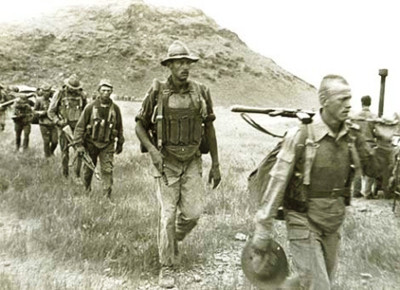By Yasar Sharifi
Wasel Khan relives the horror of the Hada massacre, one of the most brutal attacks on civilians in Afghan history. A testimony*
The village of Hada in Nangarhar province had waited all year for Jahanzeb's wedding in December 1984. Winter weddings are a time of celebration in snow-bound parts of the country.
Jahanzeb, a soldier in the Afghan army, had come home for the wedding. Everyone in the village in Behsood district was invited. People were attired in their best clothes and jewelry. Women and children had painted their hands with henna. Rugs covered every square inch of Jahanzeb's home.
But fate had other plans, says Wasel Khan, a villager who survived the Hada massacre.
It was the fifth year of the Babrak Karmal government. Karmal rose to power in December 1979 after the Soviet Union intervened in Afghanistan and killed his predecessor, Hafizullah Amin.
Wasel Khan recounts that Russians troops suddenly marched into the village in the evening of Jahanzeb's wedding day. There was panic, he recalled. Within minutes the revelry had been replaced by screams, he said. "The Russian army and air force perpetrated crimes that cannot be described in words," he said.
Hada village was targeted for being anti-government. Wasel Khan insists not all the people were mujahedin; most were only sympathisers. "Our village had 2,000 families before the Russian invasion. Most people fled but families from other areas had moved in. There were mujahedin among them. A former villager informed the Russians that ours was a Russian hating village. The wedding was seen as the perfect opportunity to cleanse the village," he said.
No mercy
Wasel Khan says the informer, who he calls Mullah Sultan Jan, told the Soviet authorities that Hada was responsible for the attacks on Jalalabad, 9 kms from the village.

Soviet soldiers in Afghanistan. (Photo: http://variantedeflapjack.blogspot.com/2012/05/solo-cuando-todo-el-mundo-muera-acabara.html)
He insists the mujahedin in Hada had never targeted Jalalabad. It was the work of mujahedin factions from Pachir and Chaparhar. "The lies turned a happy night of feasting at the wedding into a big sorrow - many of our young were killed," he says.
Soviet soldiers searched every house in the village, and took away 100 old and young men who were made to stand in two groups in a field.
A cold wind blew; the silence of death was on everyone's lips. "They were infidels, they had no mercy. They suddenly fired at the group on the left, killing many. The injured writhed on the ground till they died. There was a stream of blood," says a man called Uncle Aslan, who is standing next to Wasel Khan. The group of men on the right, he said, were jailed for a few days, tortured and released.
Uncle Shaperai was amongst the prisoners. "They (Russians) made us push tanks in the mud, and beat us. The day after I was released I left the country," he said.
Soviet soldiers did not catch the prospective bridegroom, Jahanzeb. The brave soldier climbed to the top of the hill above the village, and killed Russian soldiers who had lost their way in the chaos of the bloodbath.
"We begged him not to take on the Russians; they were so many and he was alone," says Wasel Khan. Many Russian mothers lost their son's that day to his bullets, he adds.
So much sorrow
In the end a Soviet helicopter downed Jahanzeb. His body, which was cut in pieces, was carried to the village. His bride-to-be was eventually married to his brother, according to Afghan tradition. "His mother had gone mad. There was so much sorrow," says Wasel Khan weeping like a child over wounds that are still raw even a quarter century later.
The villagers were not able to bury their dead, he says. "We found the Russians had placed mines even in the graveyard."
A landmine blew up the vehicle of a villager called Amir Mohammad, who was coming from Jalalabad for the funeral, killing him and three others. Within hours a landmine had destroyed another jeep. "A tribal elder was among those who died. Only one woman survived," he remembers.
Two days later the village dead were buried in the nearby area of Karezo. "Now it is called graveyard of martyrs," according to Wasel Khan.
Shamsul Rahman lost his parents in the Hada massacre. "My uncle became our caretaker, and we had to migrate to Pakistan. I did not attend school, and I have been working as a labourer ever since," he says. "I wish my father had not been killed by Russians. I would have gone to university," he adds, wistfully.
** The testimonies of survivors of war crimes are our contribution to creating greater public awareness about people's hopes and claims for justice, reconciliation and peace. These testimonies and life stories are distributed internationally by the news agency IPS-Inter Press Service and are the basis for a radio drama that is being broadcast by seven Killid radios.



